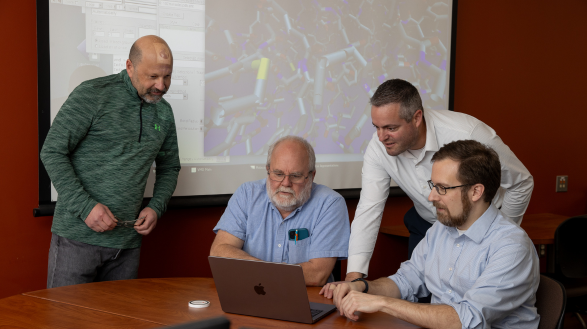Nearly $500K grant will fund high performance computing infrastructure for research in AI, machine learning, and more
An interdisciplinary working group from across Miami University campus, including CEC faculty, collaborated on the NSF grant proposal officially awarded Nov. 30.

Nearly $500K grant will fund high performance computing infrastructure for research in AI, machine learning, and more
It isn’t only CEC that benefits from the high performance computing Talon GPU cluster headed to Miami thanks to a recently awarded U.S. National Science Foundation (NSF) grant. Nevertheless, CEC faculty made up half the core group that helped secure it.
Miami University’s proposal for the $494K NSF Campus Cyberinfrastructure Grant was led by Principal Investigator Rick Page (Ernest H. Volwiler Professor of Chemistry and Biochemistry and Associate Vice President for Research and Innovation), in collaboration with Co-Principal Investigators David Seidl (Vice President for Information Technology and Chief Information Officer), Jens Mueller (Adjunct Assistant Professor of Computer Science and Software Engineering at CEC and Director of High Performance Computing Services), and Scott Campbell (Instructor of Computer Science and Software Engineering and Senior Director of Technology at CEC).
With the NSF funding, Miami University will be able to procure a Talon GPU cluster, a crucial piece of infrastructure that will facilitate research requiring high performance GPU computing. The Talon will also be an important tool for students to obtain hands-on GPU programming experience in the classroom. With the Talon GPU cluster, students and faculty across academic divisions can further learn and research in areas such as:
- The development of sophisticated simulations of atomic nuclei,
- The development and use of AI chatbots for complex technical handbooks,
- In silico screening of enzyme inhibitor candidates via machine learning,
- The development of machine learning algorithms for automated analysis of image-based manufacturing quality control,
- And much more.
As part of their funding proposal, the Miami University working group wrote that, with the Talon GPU cluster, Miami faculty would be supported in their aim to continue “incorporating the impact of artificial intelligence into courses, as well as connect research to education efforts centered on ethical issues around artificial intelligence.”
Artificial intelligence and machine learning are top of mind both in CEC coursework and across Miami University university as a whole, as evidenced by Miami’s recent A.I. Symposium. “High Performance computing (HPC) resources such as the Talon GPU will enable our faculty in the College of Engineering and Computing to pursue research and train undergraduate and graduate students,” said Beena Sukumaran, Dinesh and Ila Paliwal Dean of Miami's College of Engineering and Computing. “It will be beneficial to a cluster of faculty across all four departments in the college and it will help them forge ahead in cutting edge research topics such as Generative AI.”
The Talon GPU cluster is projected to be ready to use by students and faculty by summer 2024.